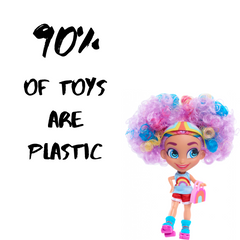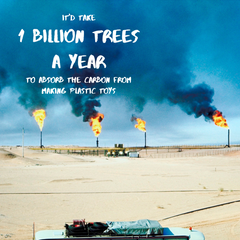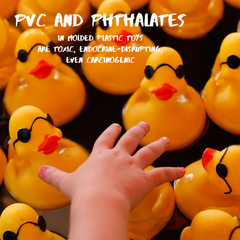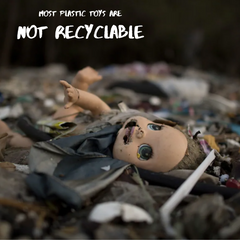Plastic-free why?
Avoiding plastic is a very powerful way to support our planet (and care for our kids). Here are 3 reasons why:
1. Avoiding plastic saves a lot of pollution and carbon emissions:
1. Avoiding plastic saves a lot of pollution and carbon emissions:
- Plastic is made from petroleum
- Extracting petroleum from the ground can be very destructive: fracking, felling forests, oil spills.
- Then refining and processing it into plastic releases 6kg CO2 per 1kg plastic:
- This alone is 3/4 of LEGO's carbon footprint;
- To absorb the CO2 released by the $80 billion of plastic toys made globally each year would take 1 billion trees*.
- Just for toys bought in Ireland, we'd have to plant 3.6 million trees to absorb the CO2 released making them from plastic.
- That’s 4 trees for every child;
- EasyTreesie is a huge effort to plant 1 million trees by 2023; so we’d need 4 of these programmes;
- Just to offset the carbon footprint of our toys - before offsetting flights, driving, fossil fuel energy generation, plastic in other industries, animal agriculture, etc.
- The Ellen MacArthur Foundation estimates use of plastic causes 6% of all global CO2 emissions.
2. Natural materials are much safer for children:
- Some plastics (e.g., PVC) and some chemicals that make them (e.g., phthalates), are toxic and even carcinogenic;
- A 2017 test by 4 EU countries of 104 Chinese-made toys found illegal levels in over 30%;
- A 2017 report by ProSafe shows 17 EU and EEA authorities checked 255 toys and 20% failed, with phthalates the most common chemical found. Here's the breakdown:
- Plastic dolls – of 121 samples, 33 failed;
- Bath/squeezable toys – of 30 samples, 7 failed;
- Plastic books – of 34 samples, 0 failed; and
- Inflatable toys – of 70 samples, 10 failed.
So it's clear that in the future, toys like everything else will need to move-on from new plastic. See our other blog posts for more on what, how, and where!





* Here's how we estimated this:
- Global toy production is $90 billion (source: Statistica)
- 90% of new toys are new plastic (source: Plastics Europe, association of plastics manufacturers)
- Average kg of plastic per $ spent on toys is 0.05, based on a sample from www.amazon.com
- Producing 1 kg new plastic emits 6 kg CO2:
- Producing 1 kg of polyethylene (PET or LDPE) requires 2 kg of oil for energy and raw material (see here); and
- Burning 1 kg of oil creates about 3 kg CO2 (see offline carbon footprint calculator).
- 2 kg oil * (3 kg CO2 per kg oil) = 6 kg CO2 per kg new plastic
- 1 tree can absorb 22 kg of CO2 per year (source: Carbonify)
- $90 billion * 90% * 0.05 kg/$ * 6 / 22 kg = 1.1 billion trees
* Second calculation from a different starting point (triangulation):
- "The global toy industry uses 40 tons plastic per $1 million revenue." - UNEP report 2014 “Valuing plastics”
- (40 tons * 907kg per ton * 6kg CO2 per kg plastic * $90 billion total revenue) / (22kg absorbed per tree * per $1 million revenue) = 890 million trees
** How we calculated for Ireland:
- Republic of Ireland toy market 2015 = €215 million = $275 million (source: Gameplan Europe)
- Republic of Ireland GDP per capita 2015 = $63,000; GDP 2020 = $84,000 (source: MacroTrends). Upsize the toy market proportionally to get a 2020 estimate of $366 million
- $366 million * 890 million trees / $90 billion global market = 3.6 million trees
